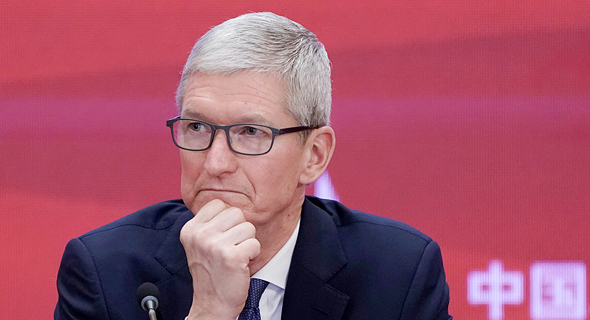Apple Passes Over Intel in Search for Chips for a Future iPhone
Update: Apple has notified Intel it will not use a Wi-Fi and Bluetooth component developed by the chipmaker in its next-generation mobile device
A previous version of this article incorrectly stated that the Sunny Peak component also included 5G connectivity.
For daily updates, subscribe to our newsletter by clicking here.
In the communications reviewed, Intel executives described Apple as the “key mobile customer” for the developed component. Intel expected Apple to be the “main volume driver” for the product, they said.
 Apple CEO Tim Cook. Photo: Reuters
Apple CEO Tim Cook. Photo: Reuters
In response to Calcalist’s request for comment, an Intel spokesman said the company does not comment on matters pertaining to its customers on Wednesday.
On Thursday, Intel issued an official comment on Calcalist's original report. "Intel’s 5G customer engagements and roadmap have not changed for 2018 through 2020. We remain committed to our 5G plans and projects.,” the company said.
Apple has yet to respond to a request for comment.
Sunny Peak is a Wi-Fi and Bluetooth component designed by Intel for Apple’s future phone.
"Every aspect of the cellular communication system is changing to deliver the major improvements in speed, latency, and reliability, with 5G," Intel executives said.
Apple is facing “a massive effort” to launch 5G in their mobile products, Intel executives posited in communications. They further speculated Apple’s decision not to use Intel’s component was a result of “many factors.”
The introduction of a new speedy Wi-Fi standard called WiGig (802.11ad) “into any mobile product brings new and unanticipated challenges,” they stated.
- Silicon is “Unforgiving,” Says Apple’s Chip Chief Johny Srouji
- The Parallel Career Paths of Apple’s Johny Srouji and Tim Cook
- Apple Developing its Own Power Management Chips, Report Says
Intel’s executives said the company is now looking to further improve Sunny Peak to get the component into Apple’s 2022 mobile devices. The company intends to redirect the team that worked on Sunny Peak to other efforts, in an attempt to boost Intel's 5G programs, they added.
A June Bloomberg report cites Northland analyst Gus Richard as saying Intel is at risk of losing Apple’s modem business and suggesting Intel could be displaced by Taiwanese modem manufacturer MediaTek Inc. In April, Bloomberg reported Apple is looking to begin using its own chips in Mac computers as early as 2020, phasing out Intel chips.



